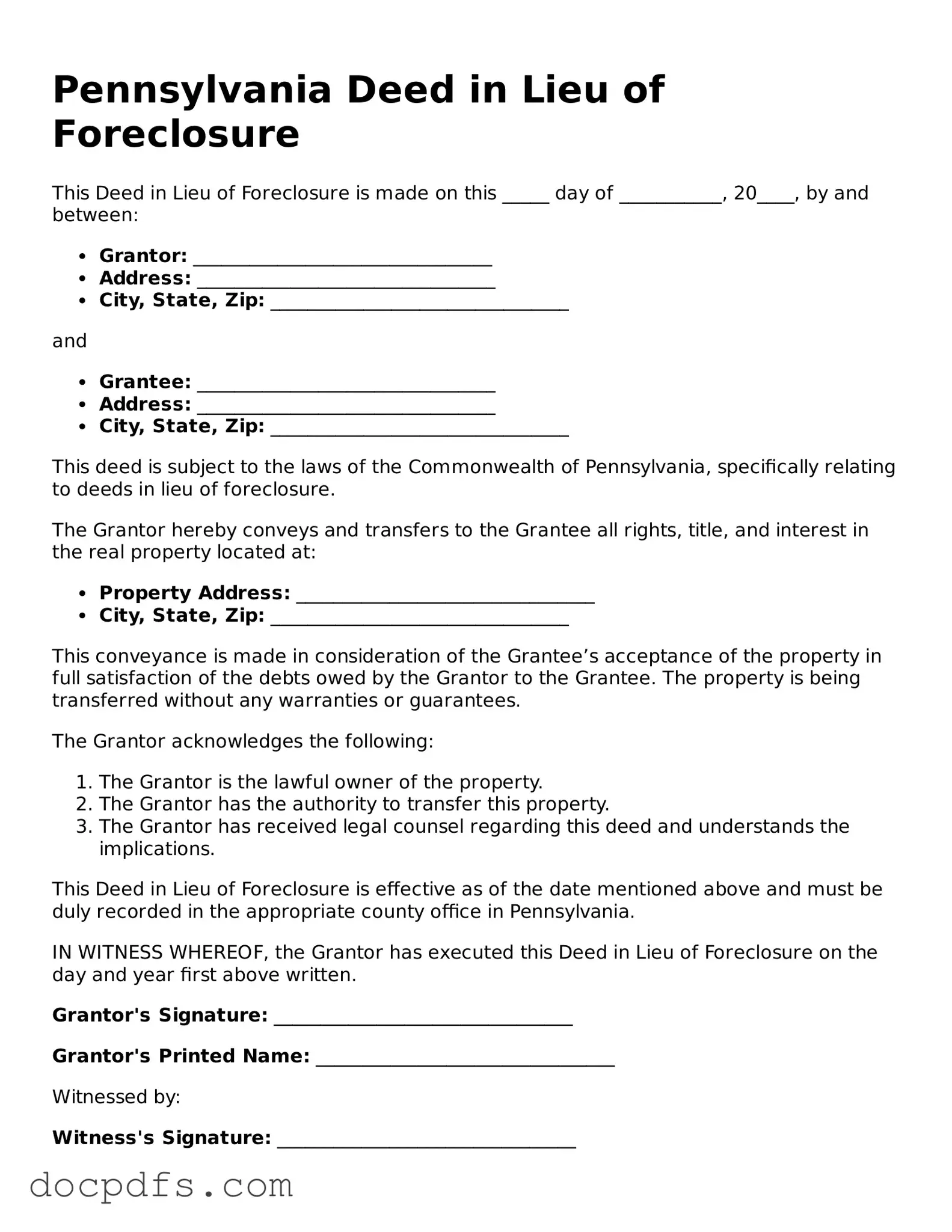What is a Deed in Lieu of Foreclosure?
A Deed in Lieu of Foreclosure is a legal document in which a homeowner voluntarily transfers the ownership of their property to the lender to avoid the foreclosure process. This arrangement allows the borrower to settle their mortgage debt without undergoing the lengthy and often stressful foreclosure proceedings.
Who is eligible for a Deed in Lieu of Foreclosure in Pennsylvania?
Eligibility typically includes homeowners who are facing financial hardship and are unable to continue making mortgage payments. Lenders often require that the borrower is in default or at risk of default. Additionally, the property must be free of liens other than the mortgage being settled.
What are the benefits of a Deed in Lieu of Foreclosure?
There are several benefits to consider:
-
It can be a quicker and less expensive alternative to foreclosure.
-
Homeowners may avoid the negative impact on their credit score that comes with foreclosure.
-
It allows for a smoother transition out of the property.
-
Some lenders may offer relocation assistance or other incentives.
What are the potential drawbacks of a Deed in Lieu of Foreclosure?
While there are benefits, there are also potential drawbacks:
-
The homeowner may still be liable for any deficiency balance if the property sells for less than the mortgage amount.
-
Not all lenders accept Deeds in Lieu, which could limit options.
-
It may still impact the homeowner's credit, though typically less severely than a foreclosure.
How does the process work?
The process generally involves the following steps:
-
The homeowner contacts their lender to discuss the possibility of a Deed in Lieu.
-
The lender will evaluate the homeowner's financial situation and the property's value.
-
If approved, both parties will sign the Deed in Lieu of Foreclosure document.
-
The lender will then take possession of the property.
What should homeowners do before pursuing a Deed in Lieu of Foreclosure?
Homeowners should consider the following steps:
-
Consult with a housing counselor or a legal professional to understand the implications.
-
Gather financial documents to present to the lender.
-
Explore all options, including loan modification or short sale, before proceeding.
Will a Deed in Lieu of Foreclosure affect my credit score?
Yes, a Deed in Lieu of Foreclosure can affect your credit score, but typically not as severely as a foreclosure. The exact impact can vary based on individual credit histories and other factors. It is advisable to check your credit report after the process is completed to understand the full effects.
Can I negotiate terms with my lender?
Yes, homeowners can negotiate terms with their lender. This may include discussing potential relocation assistance, the timeline for vacating the property, or any deficiency balances. Open communication with the lender is crucial for a successful negotiation.
What happens after the Deed in Lieu of Foreclosure is signed?
Once the Deed in Lieu is signed, the lender will take possession of the property. Homeowners are typically required to vacate the premises within a specified timeframe. The lender will then handle the sale of the property, which may involve repairs or renovations before listing it on the market.
Is legal assistance recommended when considering a Deed in Lieu of Foreclosure?
Yes, it is highly recommended to seek legal assistance when considering a Deed in Lieu of Foreclosure. An attorney can help navigate the complexities of the process, protect the homeowner's rights, and ensure that all necessary documentation is properly completed.

